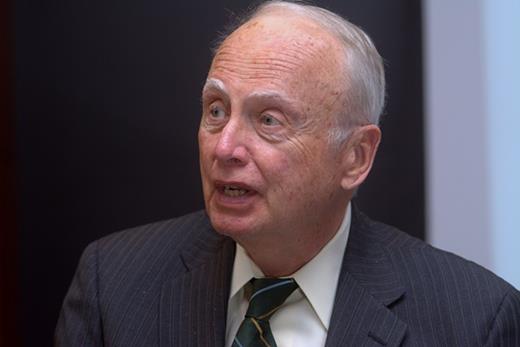Dr. Bernard G. Forget died on November 6, 2015, at the age of 76, after a three-year battle with cancer. The hematology community has lost one of its most beloved and esteemed colleagues.
Bernie was born in Fall River, Massachusetts, where his French Canadian father served as a dedicated general practitioner. After undergraduate training at the University of Montreal, Bernie received an MD in 1963 from McGill University where he was class valedictorian. Following a medical internship and residency at Massachusetts General Hospital, he received training in hematology at the National Institutes of Health (NIH) and at Children’s Hospital in Boston. His early scientific development was fostered by the mentoring of Drs. Roger Monier, Sherman Weissman, and David Nathan.
In 1976, Bernie joined the Departments of Medicine and Human Genetics at Yale University where he devoted the remainder of his career. He was chief of Yale’s Section of Hematology from 1976 to 1987, and again from 1993 to 2005. During this 30-year span, he made landmark research contributions and oversaw the training and mentoring of a generation of students, residents, and fellows, many of whom have become leaders in hematology research and clinical practice.
Bernie and his research team pioneered studies of molecular pathogenesis of congenital red cell disorders. He was the first to use specific ribonucleases to prepare two-dimensional maps of globin mRNA that enabled sequence information to be generated on both coding and noncoding segments. This early work was critically important in facilitating the cloning of globin genes. His studies of the flanking regions of the human γ-genes provided insight into the physiologically and clinically important switch from γ- to β-gene expression. Subsequently, Bernie’s lab focused on the molecular genetics of red blood cell (RBC) membrane proteins. His lab was the first to clone and sequence genes encoding α- and β-spectrins, the major proteins of the RBC cytoskeleton. These studies paved the way toward a molecular understanding of the assembly of red cell membrane proteins. Bernie’s work on the globin genes and on those encoding RBC membranes have clear-cut relevance to important blood disorders such as thalassemia, sickle cell disease, and congenital hemolytic anemias due to mutations in red cell membrane proteins.
During his long and remarkably productive career, Bernie received many honors, including membership in the American Society for Clinical Investigation, the Association of American Physicians, and the American Academy of Arts and Sciences. He was awarded the Henry M. Stratton Medal from ASH in 1996 and was the recipient of the Yale Cancer Center Lifetime Achievement Award in 2013.
A happy and fulfilling family life was a huge contributor to Bernie’s remarkable record of leadership and discovery. During their time together in New Haven, his wife Bernadette held a position of comparable responsibility in nursing at the Yale-New Haven Hospital. She and Bernie were blessed with three children and three grandchildren. The Forget family cherished time together at their seaside home in Rhode Island as well as frequent trips to France, which helped sustain Bernie’s Gallic pride and temperament.
Photo. "Dr. Bernard Forget" by John Curtis from Yale Medicine.
Competing Interests
Dr. Bunn indicated no relevant conflicts of interest.

